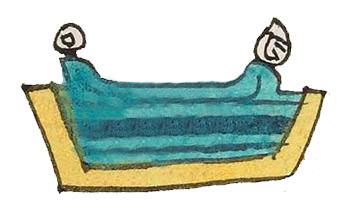apantli (Mdz50r)
This element of a canal (apantli) has been carved from the compound sign for the place name, Aztaapan (see below). This waterway has horizontal black lines of current of varying thicknesses, suggestive of movement. The canal's liner, which gives it some structure, is yellow and it is shown in a cross-section view. The overall shape is trapezoidal, again suggesting that it is a constructed waterway and not natural. A droplet and a turbinate shell splash off the top of the water. Their placement has been affected by the fact that an object was removed from the middle of the original compound glyph, but they are emblematic of the iconography for water.
Stephanie Wood
In the compound, this element played a phonetic role, but here we will just call it a logogram. The apantli glyph or element can have a wide range of color combinations for the lining around the water, while the representation of the water remains much the same (but with or without the splashes coming off the top). The lining can be a single color (red, yellow, or green), or it can be two or three colors. See some examples below.
Stephanie Wood
c. 1541, or by 1553 at the latest
Stephanie Wood
water, shells, conchas, caracolillos, agua, canales, construcción

apan(tli), water channel or canal, https://nahuatl.wired-humanities.org/content/apantli
pan(tli), furrow, https://nahuatl.wired-humanities.org/content/pantli
-apan (locative suffix), on the water, https://nahuatl.wired-humanities.org/content/apan-0
a(tl), water, https://nahuatl.wired-humanities.org/content/atl
-pan (locative suffix), on, https://nahuatl.wired-humanities.org/content/pan
water channel
el canal, o la zanja con agua
Stephanie Wood
Codex Mendoza, folio 50 recto, https://digital.bodleian.ox.ac.uk/objects/2fea788e-2aa2-4f08-b6d9-648c00..., image 110 of 188.
The Bodleian Libraries, University of Oxford, hold the original manuscript, the MS. Arch. Selden. A. 1. This image is published here under the UK Creative Commons, “Attribution-NonCommercial-ShareAlike 3.0 License” (CC-BY-NC-SA 3.0).





